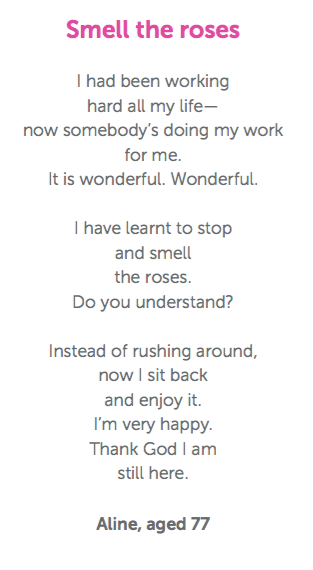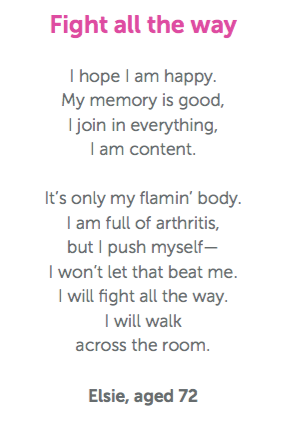Poetic Inquiry: Creating poems from interviews with residents
Qualitative social researchers are only just beginning to realise the potential of poetry, which uniquely conveys and evokes emotion in a way that enables people to viscerally experience the issues. Poetic inquiry, also known as found poetry, transcript poems, poetic transcription, and research poetry, is when researchers create poems (or poem-like prose) from qualitative interview data. In many regards, the process can be viewed as an extension of qualitative analysis, as typically established narrative markers (e.g., “I”, “we”) are utilised to identify and group the story.
The research team worked with acclaimed poet, Sarah-Holland Batt (2016 Prime Minister’s Literary Award in Poetry) and residents to create poems (or poem-like prose) from interview transcripts in a process termed poetic inquiry.The words are all participant’s own, with four steps followed: (1) deep immersion in each transcript, searching for colorful descriptions and metaphor; (2) arrange statements logically; (3) apply poetic techniques (eg rhythm, sound, emotion); and (4) edit for impact.
The special, dramatic language of poetry enables an imaginative and empathetic identification, drawing the audience into each residents’ uniquely intimate world. The honest emotion can be confronting, with each poem evoking a memorable sense of personality and aura of authenticity. Below are some examples of poems, as well as images from a poetry writing workshop we held with residents (led by poet Sarah Holland-Batt) – we had a lot of fun recalling our childhoods and creating poems from these memories.





If you would like to learn more about this process, please see our publication on poetic inquiry: Miller, E., Donoghue, G., & Holland-Batt, S. (2015). “You could scream the place down”: Five poems on the experience of aged care. Qualitative Inquiry, 21(5), 410-417.